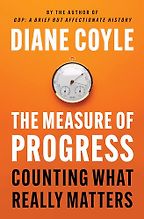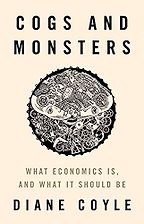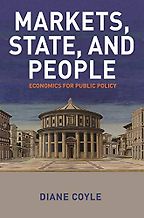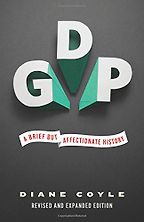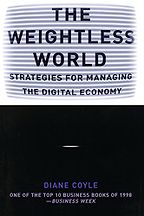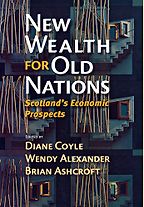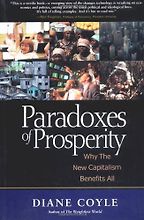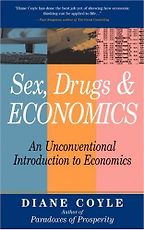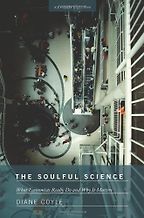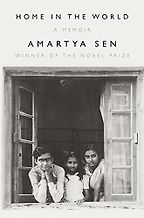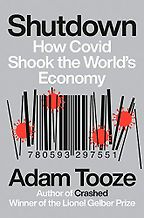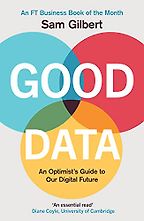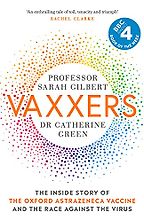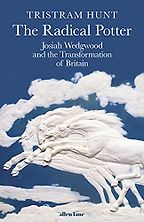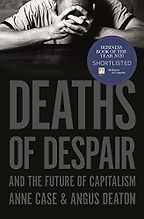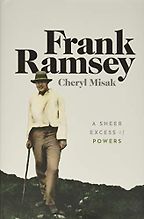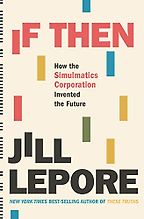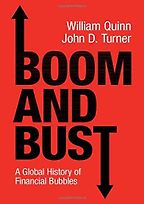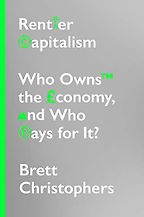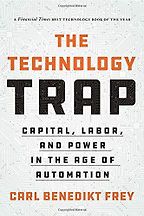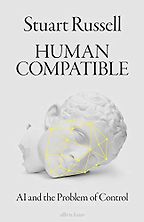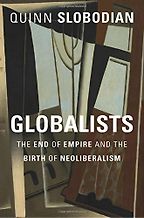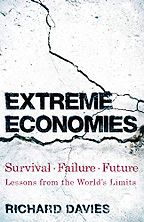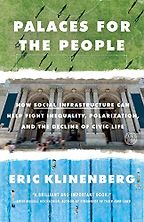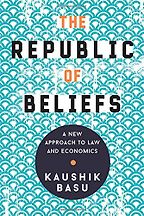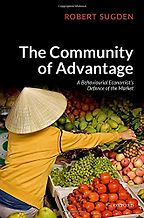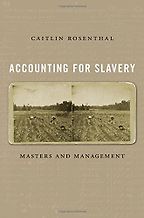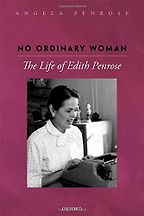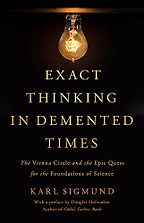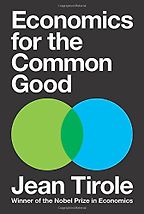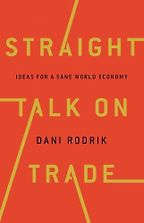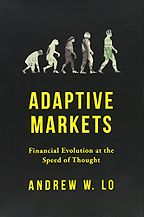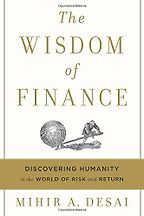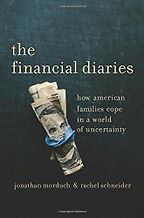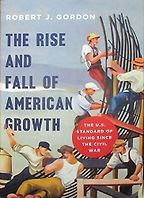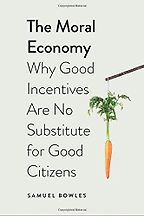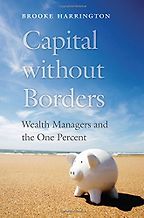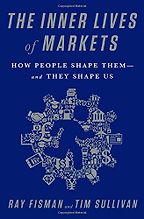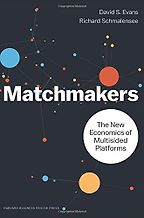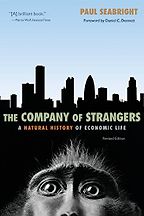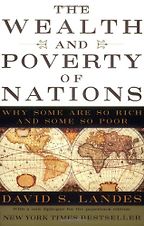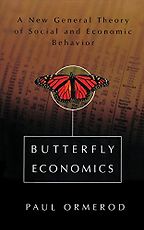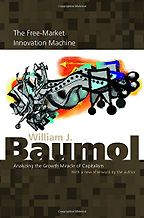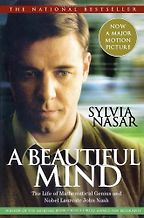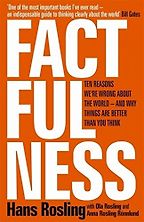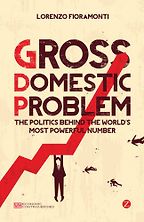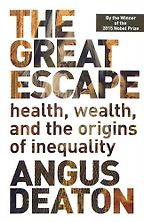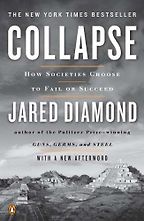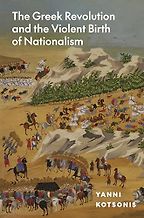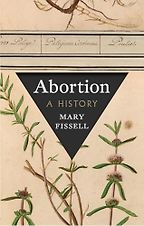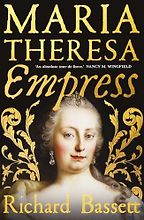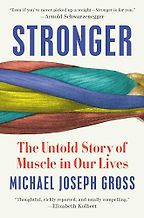
Books by Diane Coyle
Diane Coyle is Bennett Professor of Public Policy at the University of Cambridge and co-director of the Bennett Institute for Public Policy. She also runs Enlightenment Economics, a consultancy specialising in the economic and social effects of new technologies. She was awarded a CBE in 2018 and a DBE for her contribution to economic policy and practice in 2023.
“In a technical but important book, The Measure of Progress: Counting What Really Matters, economist Diane Coyle, who previously wrote about GDP, argues that we as the economy has changed, we need to be able to measure what matters to us. It reflects over a decade’s worth of research on questions of economic statistics and measurement, particularly on the digital economy.” Read more...
Notable Nonfiction Books of Early 2025
Sophie Roell, Journalist
Cogs and Monsters: What Economics Is, and What It Should Be
by Diane Coyle
In Cogs and Monsters Diane Coyle argues persuasively that the economics profession—what it researches and teaches and its use in public policy—needs to change. She argues that popular criticisms of economists—that their forecasting is poor and their assumptions about human society and behaviour simplistic and wrong—misses more important failures of the profession. In the digital age, economists need to grapple with the new challenges thrown up by the relationship between the private and public sectors and inequalities in society. Welfare economics needs to be revived and rethought to deal with the digital age and economists need to accept that their work needs to be done in a world that is unavoidably political. This book is vital for professional economists and those studying the subject, but also to anyone interested in how the world is governed and the role of economics in that.
Markets, State, and People: Economics for Public Policy
by Diane Coyle
"It’s billed as a textbook and it’s built on a course that I developed myself and have been teaching for some years. But it’s not technical and I hope is well enough written that anybody could enjoy reading it...What I try to do is demonstrate that there are some problems and some circumstances in which there isn’t a single right answer about how you do things, and there are choices and trade-offs to be made."
“Hers is a very sober account and that’s what I like about it. It’s written by a proper economist and it’s very clear. In one hundred and fifty pages or so, you get a very good guide to this number that has come to dominate public discussion.” Read more...
David Pilling, Journalist
Interviews with Diane Coyle
-

1
Home in the World: A Memoir
by Amartya Sen -

2
Shutdown: How Covid Shook the World's Economy
by Adam Tooze -

3
Good Data: An Optimist's Guide to Our Digital Future
by Sam Gilbert -

4
Vaxxers: The Inside Story of the Oxford AstraZeneca Vaccine and the Race Against the Virus
by Catherine Green & Sarah Gilbert -

5
Radical Potter
by Tristram Hunt
The Best Economics Books of 2021, recommended by Diane Coyle
The Best Economics Books of 2021, recommended by Diane Coyle
From the education of a Nobel Prize-winning economist to debates about privacy and the drawbacks of global supply chains, Professor Diane Coyle of Cambridge University’s Bennett Institute for Public Policy chooses the best economics books of 2021. These are highly readable books that also shed important light on the Covid pandemic and the world we live in.
-

1
Deaths of Despair and the Future of Capitalism
by Angus Deaton & Anne Case -

2
Frank Ramsey: A Sheer Excess of Powers
by Cheryl Misak -

3
If Then: How the Simulmatics Corporation Invented the Future
by Jill Lepore -

4
Boom and Bust: A Global History of Financial Bubbles
by John D. Turner & William Quinn -

5
Rentier Capitalism: Who Owns the Economy, and Who Pays for It?
by Brett Christophers
The Best Economics Books of 2020, recommended by Diane Coyle
The Best Economics Books of 2020, recommended by Diane Coyle
The global economy has been hit by another massive and unexpected shock this year in the form of the pandemic, which is already having knock-on effects on how people think about economics. Here, Professor Diane Coyle of Cambridge University chooses the best economics books published in 2020.
-

1
The Technology Trap: Capital, Labor, and Power in the Age of Automation
by Carl Benedikt Frey -

2
Human Compatible: Artificial Intelligence and the Problem of Control
by Stuart Russell -

3
Globalists: The End of Empire and the Birth of Neoliberalism
by Quinn Slobodian -

4
Extreme Economies
by Richard Davies -

5
Palaces for the People: How Social Infrastructure Can Help Fight Inequality, Polarization, and the Decline of Civic Life
by Eric Klinenberg
The Best Economics Books of 2019, recommended by Diane Coyle
The Best Economics Books of 2019, recommended by Diane Coyle
The urgency of the challenges facing society has led to a wonderful supply of books by leading thinkers on a variety of pressing topics. Economist Diane Coyle, a professor at the University of Cambridge and co-director of the Bennett Institute for Public Policy, recommends her top five economics books of 2019.
-

1
The Republic of Beliefs
by Kaushik Basu -

2
The Community of Advantage: A Behavioural Economist's Defence of the Market
by Robert Sugden -

3
Accounting for Slavery: Masters and Management
by Caitlin Rosenthal -

4
No Ordinary Woman: The Life of Edith Penrose
by Angela Penrose -

5
Exact Thinking in Demented Times: The Vienna Circle and the Epic Quest for the Foundations of Science
by Karl Sigmund
The Best Economics Books of 2018, recommended by Diane Coyle
The Best Economics Books of 2018, recommended by Diane Coyle
From a book about applying game theory to public policy to an account of how modern management practices were first developed on slave plantations, it’s been another good year for interesting and accessible economics books. Cambridge professor Diane Coyle talks us through her selection of the best economics books of 2018.
-

1
Economics for the Common Good
by Jean Tirole -

2
Straight Talk on Trade: Ideas for a Sane World Economy
by Dani Rodrik -

3
Adaptive Markets: Financial Evolution at the Speed of Thought
by Andrew W Lo -

4
The Wisdom of Finance: Discovering Humanity in the World of Risk and Return
by Mihir Desai -

5
The Financial Diaries: How American Families Cope in a World of Uncertainty
by Jonathan Morduch and Rachel Schneider
Best Economics Books of 2017, recommended by Diane Coyle
Best Economics Books of 2017, recommended by Diane Coyle
With an array of intriguing and accessible books coming out, there’s no excuse not to be reading about economics. The ‘Enlightened Economist,’ Diane Coyle, recommends the best economics books that hit the shelves this past year.
-

1
The Rise and Fall of American Growth: The U.S. Standard of Living since the Civil War
by Robert J. Gordon -

2
The Moral Economy: Why Good Incentives Are No Substitute for Good Citizens
by Samuel Bowles -

3
Capital without Borders: Wealth Managers and the One Percent
by Brooke Harrington -

4
The Inner Lives of Markets: How People Shape Them—And They Shape Us
by Ray Fisman and Tim Sullivan -

5
Matchmakers: The New Economics of Multisided Platforms
by David S. Evans and Richard Schmalensee
Best Economics Books of 2016, recommended by Diane Coyle
Best Economics Books of 2016, recommended by Diane Coyle
There is much left to be understood about how economies work, but an increasing number of popular books means you no longer have to be a professional economist to get a good grasp of the subject. The distinguished British economist, Diane Coyle, recommends this year’s best economics books.
The best books on Economics, the Soulful Science, recommended by Diane Coyle
British economist Diane Coyle argues that economics is not a dismal science, but a soulful one. She recommends a wide range of books illustrating how the discipline has flourished over the past two decades.
Interviews where books by Diane Coyle were recommended
-

1
Factfulness: Ten Reasons We're Wrong About The World — And Why Things Are Better Than You Think
by Hans Rosling -

2
GDP: A Brief but Affectionate History
by Diane Coyle -

3
Gross Domestic Problem: The Politics Behind the World's Most Powerful Number
by Lorenzo Fioramonti -

4
The Great Escape: Health, Wealth, and the Origins of Inequality
by Angus Deaton -

5
Collapse
by Jared Diamond
The best books on GDP, recommended by David Pilling
The best books on GDP, recommended by David Pilling
As we try to make the world a better place, how does a measure that started as a way of mobilizing for war in the 17th century help? Can it be improved on? Financial Times journalist David Pilling talks us through the best books to think about gross domestic product, or GDP.
-

1
The Greek Revolution and the Violent Birth of Nationalism
by Yanni Kotsonis -

2
Abortion: A History
by Mary Fissell -

3
Maria Theresa: Empress
by Richard Bassett -

4
Stronger: The Untold Story of Muscle in Our Lives
by Michael Joseph Gross -

5
House of Huawei: The Secret History of China's Most Powerful Company
by Eva Dou
Notable Nonfiction Books of Early 2025, recommended by Sophie Roell
Notable Nonfiction Books of Early 2025, recommended by Sophie Roell
As March draws to a close, Sophie Roell, editor of Five Books, looks at some of the nonfiction books that have come out in the first three months of 2025, from the biography of one of the world’s great female leaders to better ways to measure a country’s economy.
